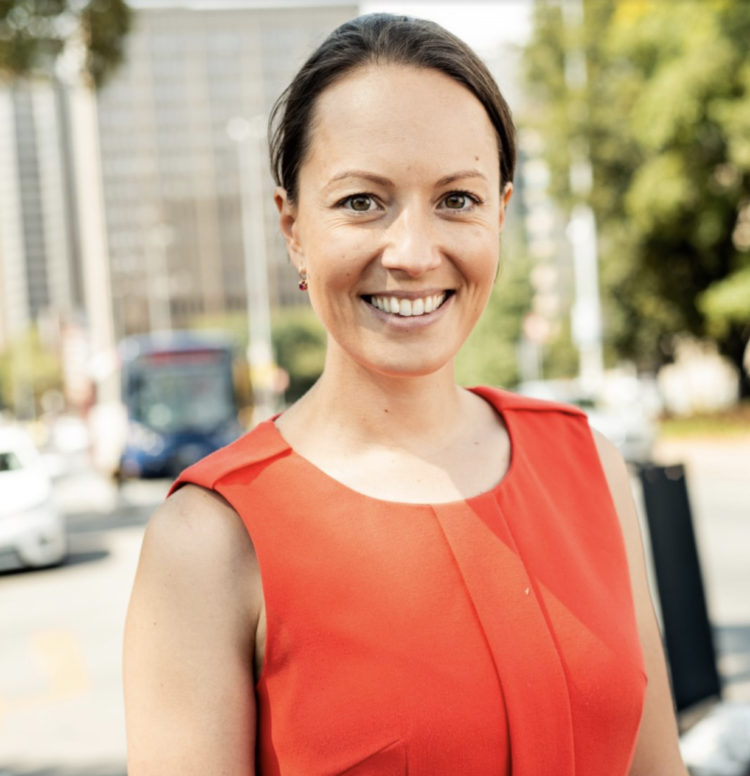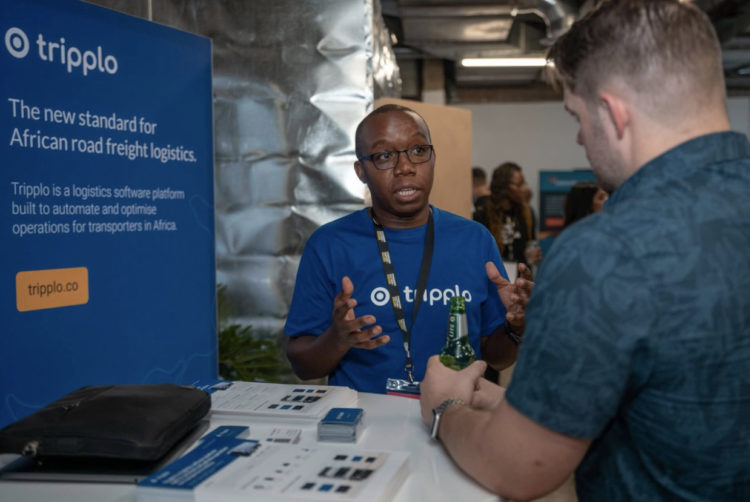In this installment of my thought leadership interview series, I had a chat with Alina Truhina, of South Africa-based venture builder Founders Factory, on how to accelerate the growth of ambitious African innovators. Founders Factory was originally launched in London in 2015 but began its African operations in Johannesburg in October 2018. The company has built 70 startups so far and plans to design, build, and scale 140 disruptive tech startups across the continent over the next five years.

Tell us about yourself.
I am Latvian-born, Russian raised, Australian citizen – living in between the UK and South Africa. I am the Chief Strategy Officer at Founders Factory Africa (“FFA”) — a venture development and investment company that builds and scales early stage, tech-enabled ventures across the continent.
My role entails raising investment for the company, developing strategy for the growth and expansion of FFA, and finding solutions to market gaps or opportunities through strategic partnerships and investments. I have worked and lived in Switzerland, France, Nepal, Pakistan and of course Africa.
More than half of new businesses fail during the first year. What do you see as the primary reasons for the failure of African startups?
The primary reason for failure that we see in early startups is Founders not understanding their market and users well enough. The oft-repeated term of “product to market fit” is important for startups to understand and achieve. Ventures that have not developed a solution to a real problem in a market, have not tested and validated the solution with their users/customer, and have not found the way to get their users to pay for the solution, are those that do not succeed beyond their early stages of existence.

Many companies are still thinking technology-first, as opposed to customer-first: an App or an online marketplace by itself is not the core solution. Technology is the enablement of your core product or service that is solving a clear user or market need. Customer validation, market validation, core product and strong team are incredibly important for early stage startups to succeed.
There’s a growing consensus that African startups are solving real human needs, but 9 out of 10 ventures never access the funding they need to build their solutions. How is your company, Founders Factory, bridging this gap?
Capital is, and always will be a continuous need for startups in any market – whether Africa or Australia or the U.S. There are of course different types of capital, serving different startups’ needs along their maturity pathway, for example runway capital, growth capital and scale capital. At FFA, we know that early stage ventures (those that are pre Series A) in Africa may require anything from $25k to $2M to grow.
We support them in two ways. One, we co-develop a clear investment strategy that is aligned to their business growth and product roadmap; and we co-design the required artefacts, including financial models and pitch decks, for the startups to have the right collateral to go and raise their next round. Two, we provide access to a network of the right type of investors at each stage (angel, VC, HNWs, DFIs etc).
Importantly, we help the business develop clear milestones for their growth and therefore put them on track to showing clear traction, data and evidence for the investors to see as proof of business success. At the end of the day, at FFA we are always asking how much is the startup ready to raise, and what is the strategy to getting them there. We then focus on getting them there.
What metrics are you tracking when considering an investment in a startup?
We are Founder-first. This means for us the Founder of the startup and their core team carries a lot of weight when deciding on the startup we chose to work with and invest in. Put simply, when considering a startup joining Founders Factory Africa, we look at (1) experience of the Founder and team, (2) product to market fit, (3) runway and capital raised, (4) network of partners, (5) defined market opportunity (scale!), and (6) product and technology.
Also, every business is unique, so there is no standard set of metrics that we track for every startup. Having said this, the most common data points we measure are revenue; runway (cash in bank) and burn-rate; number of transactions, number of customers or users; number of pilots completed; number of partners signed, to name just a few.
It’s important to remember that businesses which are early stage have little data-driven metrics. So it’s not helpful to expect a large set of quantitative data on their performance. This is the gap between what traditional corporate and VC investors want to see before they invest, and what actually exists in early businesses.
This is also partly why there is less capital going to seed stage businesses – as most of investment flows into more mature, scale stage companies that have enough data to show that they are less risky. At FFA we address this nexus between the needs of the investors and the early stage startups. We are, in that way, the best due diligence partner for investors, and an innovation de-risking partner for corporates.

Corporate-startup collaboration is vital in helping to unlock scale faster. Talk about how African startup founders can create requisite corporate partnerships.
Corporate-startup collaboration is incredibly important for startup success. Whether the partnership is a test to validate an MVP, a pilot for the beta version of the product, or a commercial contract (to name a few), corporations can propel a startup’s growth exponentially and deliver clear value.
At Founders Factory Africa, we call this value “unfair advantage.” In order to create a meaningful partnership, and for a corporation to agree to work with an early stage venture, there are some foundational elements that Founders need to ensure are in place. Just like there is a product to market fit between a solution and a user or market, there is a product-to-corporate fit which must be identified.
The biggest mistake that we see with early stage companies is that they expect to walk into a corporation and get a partnership by simply sharing their solution. Often early stage businesses are still too “immature” and therefore considered “risky” by corporates. Founders need to think more about how they can de-risk the opportunity and show a clear upside that the corporates could expect. Start with a clear plan that is rooted in commercial reality. Do not expect the corporate to agree to working with you simply because you are new on the market or are solving an impactful problem.
More often than not, each corporation will have separate country offices and business units, all of which carry divergent goals (or KPIs). Founders need to recognize this, and learn as much as they can about potential partners, in order to appeal to different business units with a clear commercial case that will deliver clear value. In other words, a partnership needs to be framed around the business goals of the individual team being pitched.
At FFA, our two corporate investors – Standard Bank Group and Netcare – work with our startups constantly and engage their teams across South Africa, East and West Africa. It is enormously satisfying to see when teams within corporates and startup teams work together to benefit each other. Corporates learn agility and iteration, and startups gain market access and technical knowledge. When such stars align, magic happens.
By the way, doing your research cannot be overemphasized: knowing and understanding the corporate’s structure, governance, scale, priorities and interests, as well as existing or past innovation efforts, will deliver enormous insight into how a startup should structure their approach to the partnership and even how to deliver their pitch. All too often, we see sales and partnership decks with no clear “ask” from the corporate. A second mistake is that the ask is not specific enough.
What does the future of the African startup economy look like to you, and what governmental policy instruments do you wish to see in supporting African entrepreneurs?
I am very excited about the future of African startup economy. It has been said many times, but some of the best startups and unicorns have surfaced during the most challenging times including the most recent financial crisis. To this end, at FFA we are looking to expand to new sectors and are looking for more corporate partners wanting to join us in building and scaling businesses across the continent. We are excited about agritech, logistics and mobility, pharmaceuticals, edtech and sustainability tech, to name a few.
We are in the middle of a complete transformation of systems, I believe. And whilst we are going through enormous turbulence, pain and suffering, there is no better time than now for entrepreneurs to support the response and recovery to Covid.
At FFA, we are already using the tech advances, new business models, new solutions to the health, financial and other basic needs, which are crucial right now and will be for the years to come. I am specifically hopeful and enthusiastic about the Africa startup ecosystem. I believe we are seeing more aspiring entrepreneurs taking a risk to start their ventures, more talent in deep-tech, product, growth and design, more corporates wanting to work with startups, and more local as well as international investors recognizing Africa as a core place to do business.
I believe very soon we will see investment numbers rise with more capital coming from the U.S., Europe and Asia. There are several governmental policy instruments being created or are explored. I applaud the creation of the Startup Act in South Africa, as well as the potential Sandbox for fintech that’s being set up. Nigeria, Ethiopia and of course Rwanda, Kenya and Tanzania are also exemplary markets.
Such regulatory frameworks are crucial in making sure that entrepreneurship is recognized, is being encouraged, and then creates a playing field that is enabling Founders of early stage businesses to succeed. Governments, and all stakeholders, must also do much more to support black entrepreneurs and women founders in entering the African startup economy. At FFA we strongly believe that this isn’t just the “right” thing to do, but the “smart” thing to do to see Africa’s economy flourish through startups.
I do believe the government can do more, especially in creating the right tax incentives, R&D incentives (for corporates and institutions) and other investment instruments that encourage capital deployment specifically into early stage and pre-Series A startups. I think that the government also needs to ensure that efforts are coordinated and integrated more. This means supporting existing startup enabling ecosystems, and offering catalytic finance to spur further private investment as follow-on.
If you missed the previous installments of this interview series, find them here. To participate in a subsequent discussion, kindly reach out by email at tomchris@sfanonline.org.
